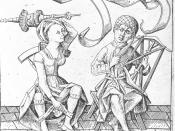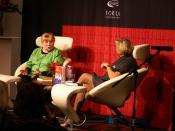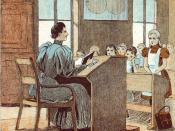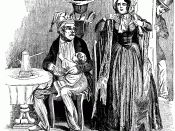In Alice Munro's short story "Boys and Girls," the division between "real" work and women's work is encountered and explored. The narrator, growing up on a fox farm, struggles with her identity changing from that of a person, neutral, showing the lack of use of her name opposed to that of Laird (lord) and capable, to that of a girl with all its accompanying restrictions and responsibilities. Fay Weldon's "Weekend" takes that division and its accompanying inequity and runs with it, demonstrating the reality of drudgery as well as the invisibility of the drudge, through a depiction of the responsibilities and impossibilities of wifehood.
The narrator of "Boys and Girls" is a pre-teen girl, vaguely aware of the gender role she will eventually fill and also vaguely resentful of it. Marlene Goldman, in her essay "Penning in the Bodies," asserts that children are constructed into gendered subjects by the use of controlled space (1).
The narrator's mother represents the inside world of kitchens, dark and uncomfortable, and the work she does is "endless, dreary and peculiarly depressing," perhaps because of its invisibility to her father. The narrator resents her mother's trying to get her to help in the house more; she would prefer to be outside with her father, doing the work she perceives as real and as "ritualistically important" (Munro 117). Perceiving the distinctions that adults take for granted, the narrator fights to maintain her place of importance in the outside, masculine world. More or less, the narrator views the kitchen as a prison, and the outside world is her haven. She grows increasingly aware of the inevitability of becoming a girl, but does not accept it, responding to her Grandmother's instructions of proper behavior with door slamming and sitting "as awkwardly as possible" (Munro 119).
The culmination of the narrator's attempts to avoid her impending girlhood and eventual womanhood arrives when one of the horses the family keeps (for meat to feed the foxes they raise) escapes her handler. Flora, the horse, was to be shot that day and butchered to feed the foxes. As Flora is running around in the barnyard, the narrator's father implores her to shut the gate, but she does not; in fact she opens it wide and lets Flora escape. "I did not make any decision to do this, it was just what I did" (Munro 125). Goldman posits that this action was a deliberate frustration of "her father's project of separating inside from outside," and that after seeing her father shoot another horse (and his complicity with the hired hand's joking about that horse's death), she no longer identifies with him, but sees him as an "abuse[r] of power" (6).
I would argue that the narrator also subconsciously identifies with Flora, as opposed to the male macho, and sees a symbol of her own resistance in Flora's escape. Her realization of the futility of Flora's attempt to break free coincides with her beginning acceptance of the gender role she is expected to fill: "Flora would not really get away. They would catch her up in the truckâ¦There was no wild country for her to run to, only farms" (Munro 125). Attempting to help Flora in her doomed escape was a symbolic last push against the narrator's inevitable acquiescing to the patriarchal world's expectations and demands, while at the same time signaling the beginnings of that same acquiescence. At the dinner table that night, her father refers to her as "only a girl," and she does not" protest that, even in [her] heart" (Munro 127).
This beginning acceptance of gender roles is taken to its somewhat bizarre conclusions in Weldon's 1978 story "Weekend". While the narrator in "Boys and Girls" is beginning to enter into a tentative acceptance of the inequities and disparities of the adult world, Martha, the segregated protagonist of "Weekend," is fully immersed in them. The breathless writing style and endless list of tasks Martha is responsible for lend a mounting tension to the progression of the story. Martha's husband Martin's comments, not quite cruel but certainly not kind, begin to pile up: "Pork is such a dull meat if you don't cook it properly," and "He can't go around like that, Martha. Not even Jasper" (Weldon 3) are not direct criticisms, but their passive-aggressive quality is infuriating. Martha internalizes Martin's comments and desires, and struggles to embody his vision of wifehood. The famous "feminine mystique" is symbolized in the conflicting expectations Martha faces: "Martin likes slim legs and big bosoms - how to achieve both? Impossible." And the telling, "But try, oh try, to be what you ought to be, not what you are" (Weldon 2). This is the key, the essence of the impossible feminine ideal: to be young and beautiful, possessed of the attributes pleasing to the male gaze, without the appearance of trying at all. Remain beautiful, light and joyful while doing all the work that is required to make a household run, but don't ever let anyone see how hard you work. Expend great amounts of energy but let it seem effortless - as evidenced by Martin's disapproval of what he perceives as Martha's "fretting": "He thought the appearance of martyrdom in the face of guests to be an unforgivable offense" (Weldon 5). Martha enjoys her job outside home because there she is allowed to work and not expected to pretend she isn't working: "She didn't have to smile at it. She just did it." (Weldon 5)Also important is the fact that because Martha is punished because she has sought meaningful work outside the home, has attempted to cross the boundary between inside and outside. Because she has taken a job, she has to pay for the cleaning woman who comes in to "replace" her, and because her husband seems to prefer homemade foods and wine, Martha is not permitted the luxury of buying the things she hasn't time to make. Bread, wine, frozen dinners (even the homemade ones are not particularly appealing to Martin's tastes) all have to be made at home, and cheerfully. After all, Martin's logic seems to conclude, why should the family suffer just because she wants to work?The world that Martha lives in is the world that the narrator of "Boys and Girls" is bound to inherit; the visibility ands legitimacy of the masculine, whether or not it is deserved is evident in both the narrator's father and in Martin, Martha's husband. The suspicion of abuse of power is fully realized and apparent in Martin, who commands the household and insists on authority in it without bearing any of the responsibility for its running. He is a grotesque caricature of male privilege running amok, and is unfortunately all too real and plausible.
Works Cited: Goldman, Marlene. "Penning in the Bodies: The Construction of Gendered Subjects in Alice Munro's Boys and Girls." Studies in Canadian Literature. [n.d.]http://www.lib.unb.ca/Texts/SCL/bin/get.cgi?directory=vol15_1/&filename=Goldman.htmMunro, Alice. "Boys and Girls." The Dance of Happy Shades. Toronto: McGraw-Hill Ryerson, 1968. 111-127.
Weldon, Fay. "Weekend" Teaching English: BBC British Council. 1978.
http://www.teachingenglish.org.uk/download/britlit/weekend/weekend.shtml





